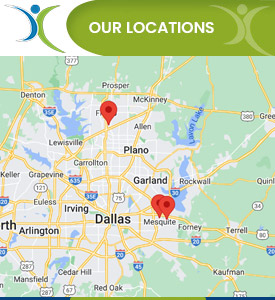Is Peripheral Nerve Stimulation the Best Alternative to Knee Replacement Surgery?
Peripheral nerve stimulation involves using electric impulses to manage pain by altering the perception of pain signals. It might be considered more appropriate for individuals not fit for surgery or who want to avoid more invasive procedures. At OmniSpine Pain Management, Dr. Andrew Morchower M.D., M.P.H. offers peripheral nerve stimulation. You can visit us at our clinics located in Frisco, TX, Sunnyvale, TX, and Mesquite, TX. For further guidance and information, contact us or book an appointment.




Table of Contents:
What is peripheral nerve stimulation?
How soon does the patient experience pain relief with peripheral nerve stimulation therapy?
How does peripheral nerve stimulation work?
What happens during the peripheral nerve stimulation same-day procedure
Chronic knee pain is a disabling condition. It impacts the quality of life of people of all ages. Indeed, knee pain is the second most common pain for which people seek medical attention. It affects up to 46% of Americans. Besides, knee problems worsen as people age. Therefore, the FDA approved several treatment options, from exercises and medicines to total knee replacement surgery. Painkillers, analgesics, anti-inflammatories, and physiotherapy don’t work in all patients. Under those circumstances, peripheral nerve stimulation may be the best alternative to knee replacement surgery. Our center offers the best treatments to help you recover your life and mobility.
Peripheral nerve stimulation, or PNS, is an FDA-approved quick-acting pain relief treatment for treating chronic knee pain. In particular, PNS is an excellent therapy for resistant pain or those patient in which painkillers don’t work. To explain, PNS is a minimally invasive same-day procedure that reduces pain immediately. Notably, peripheral nerve stimulation blocks the pain signals from a specific body area or sensory nerve, relieving chronic pain.
PNS starts working immediately, and with proper follow-ups, the pain reduction effects can last more than a year. As an illustration, PNS can alleviate chronic knee pain produced by osteoarthritis, lesions, degenerative diseases, and knee replacement surgery. Of course, your pain specialist can apply PNS to practically any body part, including the hands, shoulders, neck, groin, spine, and head. Peripheral nerve stimulation may eliminate the need for pain medications and painkillers.
Peripheral nerve stimulation relieves chronic knee pain by preventing the brain from receiving knee pain signals. Imagine the pain is a message a body part sends to the brain. If the brain doesn’t receive the message, the brain won’t produce the pain sensation. In effect, PNS blocks most pain signals from a particular sensory nerve blocking the brain from perceiving pain. In detail, PNS produces a small electrical current every time the knee sends a pain signal. This small electrical current produced by PNS intercepts the pain signal (message), blocking it from reaching the brain. In other words, PNS acts as a pain signal (feeling) bouncer, blocking or preventing selected pain signals from reaching the brain. As a result, the patient has pain chronic knee pain alleviation and requires none or less pain medication.
The peripheral nerve stimulation procedure consists of two steps to achieve the greatest pain alleviation from this pain therapy. Each step is a minimally invasive office procedure performed in less than an hour. The first step involves placing a temporal PNS on the affected area to establish that at least 50% of chronic pain has been reduced. In the second step, your doctor will implant a permanent PNS after the patient confirms a permanent pain reduction of at least 50% over one or two weeks.
The first step is a temporal peripheral nerve stimulation placement.
1. A pain specialist identifies the sensory nerves’ location responsible for transmitting pain sensation from the affected knee.
2. The pain doctor localized the affected knee sensory nerves using ultrasound or other imaging equipment.
3. After numbing the area, the pain specialist makes small incisions in the thigh.
4. After confirming the sensory nerve identification, your doctor inserts a tiny electrode similar to a small needle in the selected nerve. The tiny electrode is connected to a thin wire. This procedure is repeated in other selected nerves to block all sensory knee nerves.
5. A pain specialist connects the electrode wires to an external peripheral nerve stimulation device and sets the proper firing rate to block the pain signals.
6. After a couple of hours and the patient’s confirmation of at least 50% of pain relief, the patient can go home.
Second Step, permanent PNS implantation
1. After corroborating pain treatment success by patient confirmation of at least 50% of pain relief, the patient is ready for permanent PNS implantation.
2. After numbing the area, your pain specialist makes a small incision to implant a small PNS device.
3. The thin electrode wires are inserted into the battery of the permanent PNS.
4. Your pain doctor places the permanent PNS below the skin to relieve chronic knee pain.
5. After confirming treatment success, the patient goes home.
Make your appointment right now. Our specialists offer the best pain management strategies to alleviate chronic knee pain. You can visit us at our clinics located in Frisco, TX, Sunnyvale, TX, and Mesquite, TX. For further guidance and information, contact us or book an appointment. We serve patients from Dallas TX, Frisco TX, Mesquite TX, Sunnyvale TX, Plano TX, Garland TX, Forney TX, Cedar Hill TX, Denton TX, Balch Springs TX, and surrounding areas.
Check Out Our 5 Star Reviews






